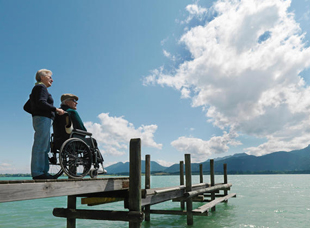Traveling with a medical condition is safe, as long as you make some arrangements to accommodate your health problem. You need to know where to go in case of an emergency, and if you have enough time to get there. There are also a few other scenarios that you should take into consideration. Here are some helpful tips on traveling with a serious medical condition that could ultimately save your life.

Investigate Local Hospitals and Medical Facilities
While you’re planning your vacation, be sure to find out about all the hospitals and medical facilities located within the state or country that you’re traveling to. Depending on your condition, you may not be able to get treatment at all of them. People that need dialysis treatments should call ahead of time to make sure the healthcare facilities offer that service, as many leave this to smaller outpatient facilities. Knowing where to go ahead of time in case of an emergency is the best way to ensure your safety. Write these places down, or save them in your cell phone for quick reference.
Refill Any Medications Before You Go
The last thing you want to happen is to run out of medication while you’re traveling. If you have any refills left, get them filled before you go. If not, make a quick call to your doctor and ask if they can call in a refill for you. Its best to have this done at your home pharmacy, but you can always fill your prescription at any licensed drugstore. You will need to have the correct location information if you plan to pick this up while you’re on the road or in between layover at the airport. But again, to avoid the hassle, just make sure that you refill before you go.
Check Your Insurance for Out of State Coverage
Even if you take your medications with you, you may still end up needing medical attention while you’re abroad. Depending on the type of insurance that you have, you may not be covered in these instances. If this is the case and you happen to visit an emergency room in a place other than your home state, you could end up with a significant medical bill to pay. Check with your insurance company to make sure that you’re covered anywhere you go. If you don’t have this type of protection, it would be well worth it to add this to your policy before you take a trip. People with medical conditions are more likely to visit the doctor while they’re vacationing than those without any health problems. This is one of the best things you can do for yourself if you’re a frequent traveler.
Let Other Travelers Know About Your Condition
You may be a private person, but if you have a serious medical condition, you need to let the people you’re traveling with know about it. They should be on alert if anything happens to you, or if they notice you acting strange. People with diabetes and hypertension should always follow this, as someone needs to be able to recognize when you’re on the verge of a diabetic coma, or know that you forgot to take your blood pressure medicine. Mishaps can happen and it’s up to your travel companions to have your back when you’re on vacation. If they don’t know that you’re ill or what to look for, they could easily pass off these symptoms as fatigue.
Having certain medical conditions doesn’t mean that you’re banned from traveling. It does mean that you need to do more planning to ensure that your health needs are taken care of in case of an emergency. Following these tips is a good way to be on the safe side when you’re vacationing.
The Author is a travel consultant and planner for people with disabilities. When she’s not checking into San Diego wedding venues for clients, she enjoys reading travel brochures and planning her next vacation destination.
